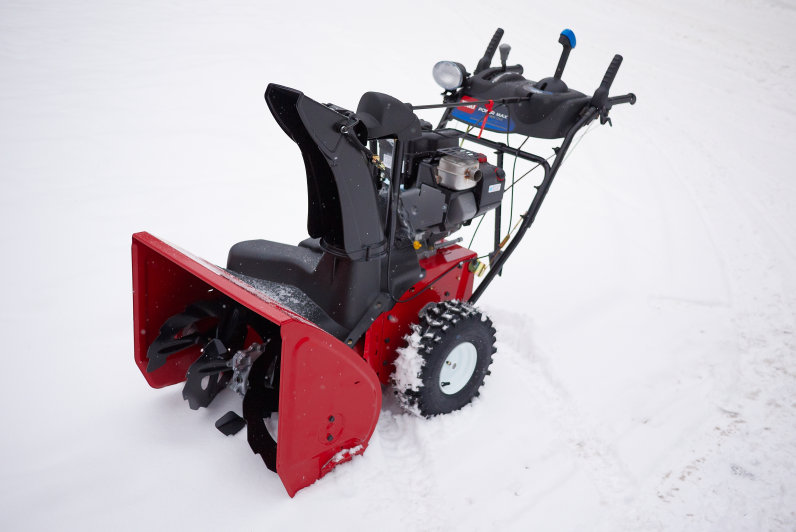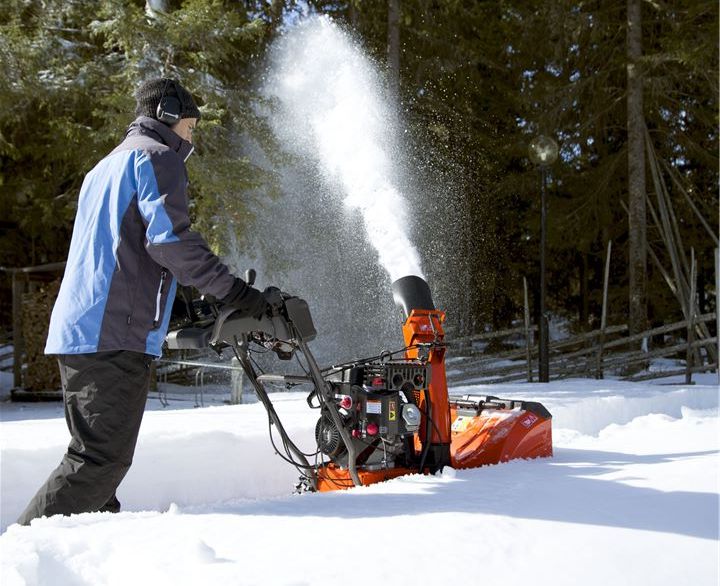Snow blowers have become a popular solution for clearing out snow during the winter months, but have you ever wondered if they are actually bad for the environment? In this article, we will explore the potential negative impacts of snow blowers on the environment and discuss alternative options that can help us keep our driveways clear without harming the planet. So, before you fire up your trusty snow blower this winter, let’s take a closer look at their environmental impact and find out if there are better ways to deal with the snow.
Negative Impact on Air Quality
Emissions from Snow Blowers
Snow blowers, especially those powered by fossil fuel engines, emit harmful pollutants into the air. These emissions include carbon monoxide (CO), nitrogen oxides (NOx), and volatile organic compounds (VOCs). These pollutants contribute to air pollution and have detrimental effects on air quality.
Carbon Footprint of Traditional Snow Blowers
Traditional snow blowers, particularly gas-powered models, have a significant carbon footprint. The combustion of fossil fuels releases carbon dioxide (CO2), a greenhouse gas that contributes to climate change. The manufacturing process of snow blowers also requires energy and resources, further adding to their carbon footprint.
Health Effects of Emissions
The emissions from snow blowers can have serious health consequences, particularly for individuals with respiratory conditions such as asthma or bronchitis. Prolonged exposure to pollutants emitted by snow blowers can worsen these conditions and increase the risk of respiratory illnesses. Additionally, the release of harmful chemicals into the air can lead to eye and throat irritation, headaches, and fatigue.
Noise Pollution
High Noise Levels of Snow Blowers
Snow blowers are notorious for their high noise levels, often reaching over 100 decibels. The constant loud noise produced by these machines can be disruptive not only to the individuals using them but also to the surrounding community. The noise pollution from snow blowers can cause annoyance, stress, and even hearing damage.
Impact on Human Health
Exposure to excessive noise from snow blowers can have adverse effects on human health. Prolonged exposure to high noise levels can lead to hearing loss, sleep disturbances, and heightened stress levels. These health impacts can negatively affect overall well-being and reduce the quality of life for individuals living in areas frequently affected by snowfall.
Disruption of Wildlife
The loud noise generated by snow blowers can also disrupt wildlife in the surrounding environment. Animals, especially those in hibernation, may be startled or disturbed by the noise, leading to disruptions in their daily routines and potential harm to their overall health. Additionally, birds and other wildlife that rely on their hearing for communication and survival may be adversely affected by the constant noise pollution.

This image is property of www.abc4.com.
Fuel Consumption and Greenhouse Gas Emissions
Fuel Consumption of Snow Blowers
Snow blowers typically consume a substantial amount of fuel during operation, especially gas-powered models. This reliance on fossil fuels contributes to the depletion of non-renewable resources and increases the demand for oil and gas extraction. The continuous use of snow blowers exacerbates the environmental impact of fuel consumption.
Contribution to Climate Change
The combustion of fossil fuels in snow blowers releases carbon dioxide into the atmosphere, contributing to climate change. Increased levels of CO2 and other greenhouse gases trap heat in the earth’s atmosphere, leading to rising global temperatures and disrupting ecosystems worldwide. The accumulation of greenhouse gases from snow blower emissions further exacerbates the already concerning effects of climate change.
Global Warming Potential of Greenhouse Gas Emissions
The greenhouse gas emissions from snow blowers have a significant global warming potential. CO2, the primary greenhouse gas emitted, has a long lifespan in the atmosphere, contributing to the warming of the planet. Other greenhouse gases released during the combustion process, such as methane and nitrous oxide, have even higher global warming potentials, further adding to the climate crisis.
Water Pollution
Chemical Runoff from Snow Blower Use
The use of snow blowers can contribute to water pollution through chemical runoff. Many snow blowers utilize chemical deicers to melt ice and snow, which can contain harmful substances like chloride and metallic ions. When these chemicals come into contact with melting snow, they can be carried into water bodies, contaminating water sources and posing a threat to aquatic life.
Contamination of Water Sources
Chemical runoff from snow blowers can contaminate water sources, including lakes, rivers, and groundwater reservoirs. The introduction of chloride and other harmful substances into these water bodies can disrupt the delicate balance of aquatic ecosystems, harming fish, plants, and other organisms that rely on clean water for survival.
Impact on Aquatic Ecosystems
The contamination of water sources due to snow blower use can have severe consequences for aquatic ecosystems. The increased levels of chloride and other chemicals can alter the pH balance of water, making it inhospitable for many aquatic species. The disruption of these ecosystems can lead to the decline of fish populations, loss of biodiversity, and long-term environmental damage.

This image is property of www.gad.net.
Energy Consumption
Electricity Usage by Electric Snow Blowers
While electric snow blowers do not produce direct emissions, they still contribute to environmental impact through their electricity usage. Electric snow blowers rely on grid electricity, which is often generated by burning fossil fuels. The overall environmental impact depends on the energy source of the local power grid. However, electric snow blowers generally have a lower carbon footprint compared to their gas-powered counterparts.
Dependency on Fossil Fuels for Gas-Powered Models
Gas-powered snow blowers are highly dependent on fossil fuels such as gasoline or diesel. The extraction, processing, and transportation of these fuels contribute to environmental degradation and carbon emissions. Additionally, their use perpetuates the dependence on finite resources and hinders the transition to more sustainable energy alternatives.
Energy Efficiency Considerations
When choosing a snow blower, considering its energy efficiency is crucial. Look for models with Energy Star certification, as these are designed to consume less electricity or fuel while maintaining optimal performance. Energy-efficient snow blowers can significantly reduce energy consumption and minimize their environmental impact.
Disposal and Waste
Environmental Impact of Snow Blower Disposal
The disposal of snow blowers can have a significant environmental impact. Many snow blowers contain hazardous materials such as oil, gasoline, and batteries, which can leach into the soil and water if not disposed of properly. Improper disposal can also result in these harmful substances being incinerated or ending up in landfills, further contributing to pollution and resource depletion.
Electronic Waste Management Challenges
Snow blowers, particularly electric ones, contribute to the growing problem of electronic waste. Disposing of electronic devices can be challenging, as they often contain toxic substances and require specialized recycling processes. Without proper electronic waste management practices, snow blowers can contribute to the accumulation of hazardous materials in landfills and create health and environmental risks.
Recycling Programs and Options
To mitigate the environmental impact of snow blower disposal, recycling programs and options should be explored. Many municipalities and retailers offer recycling programs specifically for electronic waste, including snow blowers. These programs ensure that hazardous materials are properly handled and recycled, minimizing the release of pollutants into the environment and promoting resource conservation.

This image is property of edenapp.com.
Alternative Solutions
Manual Snow Removal Methods
Alternatives to snow blowers include manual snow removal methods, such as shoveling or using push brooms. Although these methods require more physical effort, they have no direct emissions or noise pollution. Manual snow removal methods can also be seen as an opportunity for physical exercise and can foster a sense of community by encouraging neighbors to help each other during snowfall.
Use of Environmentally Friendly Deicers
Instead of relying solely on snow blowers, environmentally friendly deicers can be utilized to manage snow accumulation. Bio-based deicers, such as those made from corn or beet juice, are less harmful to the environment compared to traditional chemical deicers. These alternatives are effective in melting ice and can minimize the environmental impact associated with snow removal.
Landscape Modifications to Minimize Snow Accumulation
Strategic landscape modifications can help minimize snow accumulation, reducing the need for extensive snow removal. For example, planting dense evergreen trees or creating windbreaks can prevent snow from accumulating in specific areas. Additionally, properly graded driveways and walkways can aid in snow removal by facilitating easier clearing without the need for heavy machinery.
Government Regulations and Incentives
Emission Standards for Snow Blower Manufacturers
Government agencies can impose emission standards on snow blower manufacturers to limit the environmental impact of these machines. By requiring manufacturers to develop cleaner and more efficient snow blowers, governments can reduce air pollution and promote the production of more sustainable equipment.
Energy Efficiency Labels and Ratings
Energy efficiency labels and ratings can play a crucial role in guiding consumers towards more environmentally friendly snow blowers. Clear and standardized labels provide information on energy consumption, emissions, and overall efficiency. This enables consumers to make informed purchasing decisions, considering the environmental impact of the equipment they choose.
Incentives for Purchasing Environmentally Friendly Equipment
Governments can also offer incentives to encourage the purchase of environmentally friendly snow removal equipment. These incentives may include tax credits, rebates, or subsidies for individuals who opt for electric or low-emission snow blowers. By providing financial incentives, governments can motivate consumers to choose equipment that has a reduced impact on the environment.

This image is property of www.gardentoolexpert.com.
Consumer Choices and Responsibility
Considerations when Purchasing a Snow Blower
As a consumer, it is essential to consider the environmental impact when purchasing a snow blower. Look for models that have higher energy efficiency ratings, lower emissions, and use environmentally friendly deicers. Choosing electric snow blowers over gas-powered ones can significantly reduce carbon emissions and overall environmental impact.
Proper Use and Maintenance Practices
Proper use and maintenance of snow blowers can help minimize their negative impact. Regular maintenance, such as cleaning and tuning the machine, ensures optimal performance and reduces emissions. Additionally, following manufacturer recommendations for fuel and oil use, as well as properly storing and disposing of harmful substances, can further Minimize environmental harm.
Education and Awareness for Sustainable Snow Removal
Education and awareness initiatives play a crucial role in promoting sustainable snow removal practices. Providing information on the environmental impact of snow blowers, alternative methods, and best practices for minimizing harm can empower individuals to make more sustainable choices. Collaborating with local communities, schools, and organizations can help spread awareness and encourage widespread adoption of environmentally friendly snow removal practices.
Conclusion
While snow blowers provide convenience in snowy climates, their negative impact on the environment cannot be ignored. From emissions and noise pollution to water contamination and energy consumption, snow blowers pose a significant environmental challenge. However, by adopting alternative solutions, implementing government regulations, and making conscientious consumer choices, we can minimize the environmental footprint of snow removal and work towards a more sustainable future.

This image is property of www.travelers.com.
